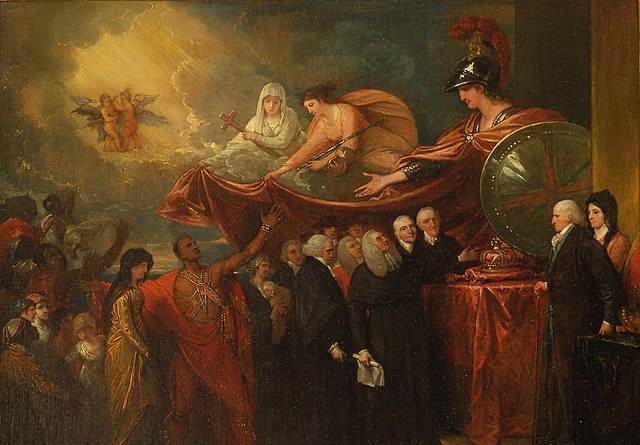Long live King George!
The American loyalists who fought to prevent the birth of the United States of America

Painting from 1783 by the painter Benjamin West depicting the goddess Britannia (personification of Great Britain) welcoming the American Loyalists persecuted by the new American state. Among the Loyalists you can also see indigenous people and freed blacks, some of whom will emigrate to Canada after the victory of the rebels, receiving land and protection from the British. Image from Commons.wikimedia.org
During the American Revolution, about 15% of the white population of the Thirteen Colonies, roughly 400K people, remained loyal to King George III. These were known as "American Loyalists" (in contrast to the Patriots) and were also nicknamed Tories, due to their affinity with the conservative members of the British Parliament, or as "King's men." They aligned with the mother country primarily for ideological, religious, and ethnic reasons. Besides adhering to the traditional loyalty owed to the sovereign, many feared revolutionary unrest and believed that remaining within the British Empire was the best way to preserve their economic and commercial prosperity and political freedom, which they saw as being guaranteed by the London Parliament. While many of them shared the principle of "no taxation without representation," they preferred a more moderate resolution to the issue and were alarmed by the radicalism of the Patriots.
Numerous Anglican clerics and parishioners remained loyal to the king, as he was the head of both the Church and the nation. Minority ethnic and religious groups also tended to side with the crown, such as Germans in Pennsylvania, Dutch in New Jersey, Scots in Carolina, Presbyterians, and the Quakers. There were even some "black Loyalists," enslaved Africans who were promised freedom by the British government in exchange for military service. Nearly all Native American tribes favored the crown, viewing the king as a protector against the expansionist ambitions of the American colonists.
In total, about 20K Loyalist colonists, primarily organized into local militias, participated in the war, though they failed to be decisive, partly due to the difficulty of cooperating with the British army, which tended to view them as provincials more inclined to personal vendettas than to military discipline. With the birth of the United States, tens of thousands of Loyalists faced discrimination and confiscation of their properties, leading many to emigrate to Canada, Jamaica, or England, where they often received compensation in land and money from the crown. Interestingly, one staunch Loyalist was William Franklin, the son of Benjamin Franklin.
Book: Renata Ago, Vittorio Vidotto, Storia Moderna , Laterza Editors, 2021
Site: " mountvernon.org ", Lealisti, Shannon Duffy
2025-08-21
Salvatore Ciccarello
